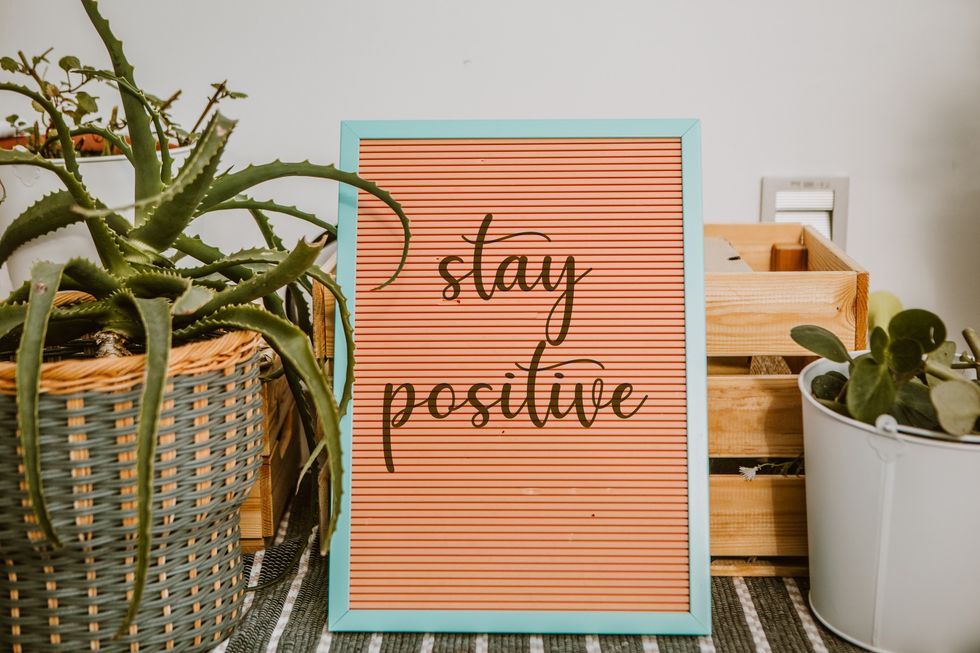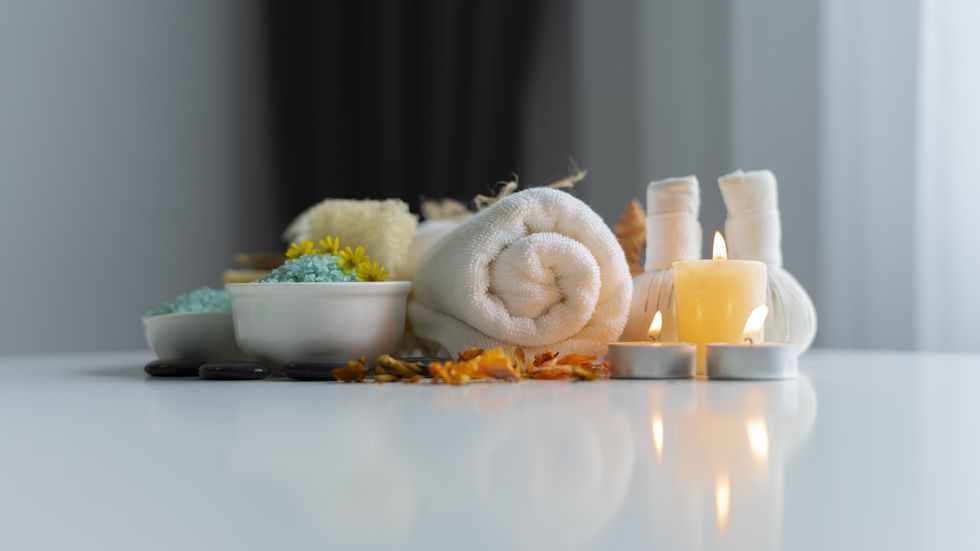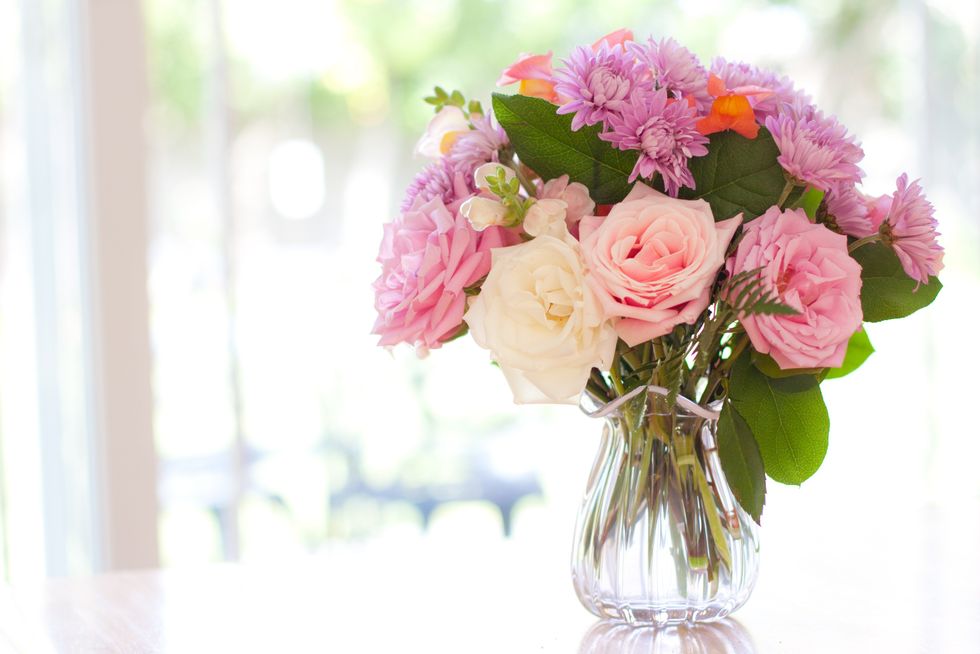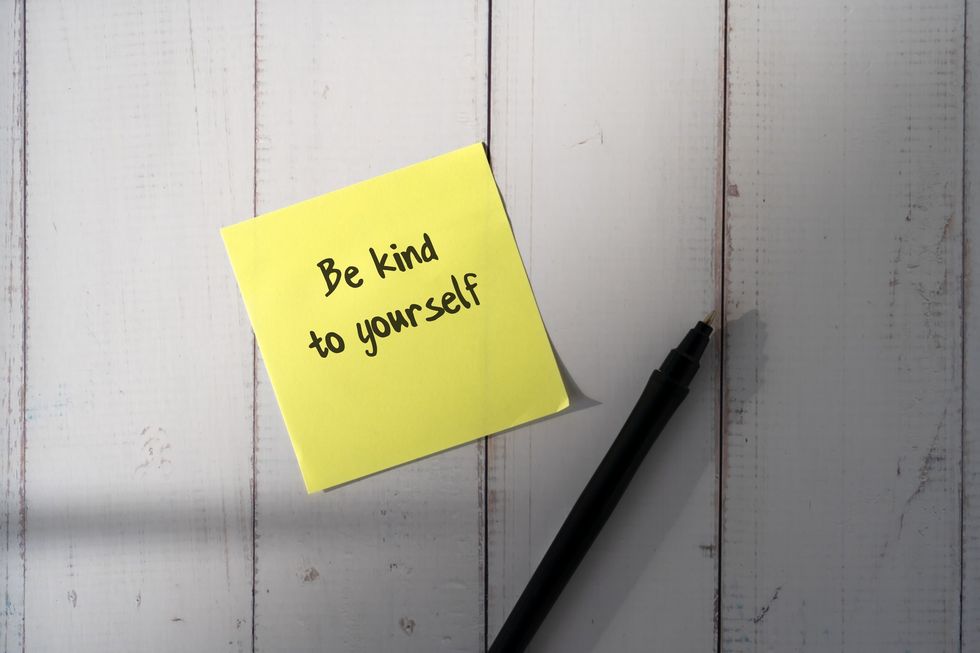
Life is gonna life. Although that might not be the most warm-fuzzy kind of way to start an article, that doesn’t make the fact any less true — and real. And since, as the Good Book says (Ecclesiastes 3), there is a time and season for everything, including weeping, losing, mourning, and other challenges, it’s really important that we exercise compassion.
Compassion is all about seeing the stress and hard times that someone is going through and having a strong desire to reduce it in some way. It’s about extending empathy. It’s about showing kindness (more on that in a bit). It’s also about giving the kind of support and space for them to feel, then heal, then come out a better version of themselves as a direct result of whatever got them to a place of needing some compassion in the first place.
Don’t get me started on how many of us could stand to take a master class as it relates to extending compassion overall. Oh, but if there’s one “compassion lane” that very few seem to drive on through life at all, it’s self-compassion — you know, learning not to be so hard on yourself, coming up with ways to extend yourself some mercy and tenderness, doing things that will soften your heart towards your own self.
While recently reading an article on self-compassion, I peeped a line in it that said, “I am patient with the process of becoming who I am.” And honestly, I don’t know if self-compassion can be explained any clearer than that.
So, what if you’re someone who knows that you could stand to learn more about the process and practice of becoming more self-compassionate yet you’re not exactly sure where to start? If that’s what’s going on, you’ve come to the right place. While these 12 tips only scratch the surface of how to give yourself more compassion, I think it will help you to get off to a really beautiful start.
1. Do Affirmation Meditations

Getty Images
Not too long ago, I was having a conversation with a friend about how much they overthink. When I asked them if they ever meditate, they said, “Every day. But after like two minutes, I have to do something else.” Umm…no. LOL. Believe it or not, for meditation to be truly effective, you need to devote somewhere between 20-45 minutes — still, calm, quiet.
Here’s the thing, though. You don’t have to sit in complete silence (if silence is a struggle for you). ASMR nature sounds (like rain, ocean waves, etc.), listening to guided instructions, or practicing mantras qualify as quality meditation too.
As far as mantras go, something that I sometimes recommend to my clients is doing affirmation meditations — you know, verbally reciting positive expressions about themselves. There are plenty of studies to support the fact that repeating things over and over can literally train your brain to think a certain way and even reprogram your subconscious. If you add to that the fact that meditation also helps to de-stress you, remove anxiety, boost creativity, keep you mindful, and help you to cope with “life life-ing”…why wouldn’t you want to love on yourself this way more often?
If affirmation mediations are something that interests you, over the next few days, come up with 10 sentences that will speak positivity in your space. Make sure that they are about building your self-esteem (like “I am rare and that is amazing”) and/or cultivating the kind of reality you want to have (like “I am in my purpose and my needs will be met because of it”). The more you declare these things, the easier it will be to become confident — and that can help you to feel good about yourself…no matter what may be happening around you.
2. Spend More Time in Nature

Getty Images
Every couple of years, I will revisit one of my favorite books — The Celestine Prophecy. One of my favorite takeaways is how important it is to spend time in nature in order to absorb some of its energy. Since taking a walk outside, doing some journaling outdoors, or even enjoying a sip of wine on your porch after dinner can help to calm you, improve your concentration, lower your risk for heart disease and give you a good dose of Vitamin D (which is a nutrient that an overwhelming amount of Black women are deficient that actually increases the chances of having bacterial vaginosis) — it is very clear how/why being outside as often as possible is truly an act of self-care.
3. Let Yourself Off of the Hook More Often

Getty Images
I am a firm believer that a part of the reason why a lot of people suck at forgiving others (check out “Are You A 'Bad Forgiver'? Read This And See.”) is because they suck even more at forgiving themselves. Just think about it — there is a certain level of awareness, humility, and understanding, when it comes to the mercy that you must have, to be able to grasp that if you want to only be around people who are not going to ever make mistakes, hurt your feelings or disappoint you, you might as well prepare to be mad on a daily basis because NOT EVEN YOU can pull that off with yourself (some of y’all will catch that later).
Without a doubt, forgiveness is an act of compassion because you are literally saying to others, “I get that you aren’t perfect and sometimes I need to not punish you for that fact.” This is such a profound way to live because it also means that you know that, sooner or later, the same forgiveness that you extend to others, you will need them to grant you — that’s how relationships work. Healthy ones anyway.
And here’s the thing — a great way to get some practice in this area is to forgive yourself — to literally “let yourself off of the hook” for things that you’ve done. It’s not about refusing to hold yourself accountable and/or not accepting the consequences that may come with your actions. It’s more about not rehearsing what transpired over and over again to the point where you build up resentment, humiliation, or even anger toward yourself. Because really, what good is that going to do?
Being compassionate by letting yourself off of the hook is taking time to feel what you feel and then choosing to learn from it and move on with the full intention of doing better the next time. I promise you that the more you learn to forgive, the less suffering you will experience — when it comes to how you deal with yourself and how you interact with others too.
4. Intentionally Reprogram “Negative Biases”

Getty Images
A couple of years ago, I penned an article for the platform entitled, “10 Ways To Keep Social Media From Triggering You (So Much).” One of the things that I mentioned in it is something known as negative (or negativity) bias. The science behind negative bias is that we’re basically hard-wired to lean toward negativity instead of positivity. This is why, if you ask someone to name five things that they like about themselves, they will probably mention the not-so-good stuff first or if a good news story pops up in a Twitter timeline, folks will skim over that and look for the entertainment gossip instead.
Another interesting thing about negative bias is it causes us to make decisions based on negative experiences instead of positive information that we may have received beforehand. In short, negative bias encourages us to take in intel that really isn’t beneficial — just easier to process because we naturally look at life from a glass-half-empty perspective.
So, now that you know what negative bias is, you might be curious about what you can do to avoid allowing it to consume you. One thing that you can do is take breaks from negativity — people, places, things, and ideas. Another thing that you can do is intentionally fill your being with positive things — upbeat music, positive conversations, and activities that make you feel good about yourself. Also, try and learn to see situations from a positive perspective — you know, like instead of constantly asking yourself, “Why is this always happening to me?” reframe your psyche by saying instead, “How is this going to work for my good?”
Working through negative biases requires quite a bit of intentionality and effort yet when you master putting the positive over the negative, it really can make you unstoppable on so many life-related levels.
5. Set Better Boundaries

Getty Images
There is a motto I made up some time ago that I have been rocking with that has brought me complete and total peace for a while now — “Be okay with being someone’s consequence. Sometimes you’ll be the best lesson that they will ever learn because you were the only one who followed through with a firm consequence for their actions.”
Listen, you don’t have the time and I don’t have the keystroke energy to get into how extreme I’ve had to go on setting limits with certain people because they were insistent on violating the boundaries that I set. It had gotten to the point where even hearing their name triggered feelings of anxiety and stress and that’s because not only were they not honoring my boundaries, but other people would try and make me feel bad for setting the boundary with them in the first place (which is just another form or revictimization).
If you don’t get nothin’ else out of this article, please hear me when I say that you should NEVER FEEL BAD FOR SETTING BOUNDARIES WITH OTHER PEOPLE. Boundaries convey limits. Boundaries are a form of protection. Boundaries are what help you to make the most out of your time, effort, energy, and resources too.
And just how can you know that you are someone who exists with healthy boundaries? Good question.
- If you don’t have a lot of toxic people in your life, chances are, you’ve set good boundaries.
- If you don’t struggle with making choices that are best for you, chances are, you’ve set good boundaries.
- If you don’t go through life feeling triggered all of the time, chances are, you’ve set good boundaries.
- If you have no problem saying “no” and verbally stating your feelings and needs, chances are, you’ve set good boundaries.
- If you don’t allow people to gaslight or manipulate you, chances are, you’ve set good boundaries.
It’s a wise person who said that the only people who hate boundaries are the ones who have every intention of violating them once they are set. That said, never feel bad for placing limits that will help you to live your best life in a space of tranquility and harmony. After all, doing what will keep you safe is one of the best forms of self-compassion that there is.
6. Give Yourself a Head and/or Foot Massage

Getty Images
Something that I treated myself to a few months ago is a battery-operated scalp massager. Although the initial intention was so it would help with hair length retention, I’m also aware that giving myself a scalp massage does everything from increase blood circulation to my head and reduce tension to relieve headaches and help me to relax better before turning in at night.
Another way to treat yourself along these same lines is a foot massage. Although there’s nothing quite like booking a professional reflexology appointment, even if you warm up a mixture of a carrier oil (like sweet almond, grapeseed, or avocado) along with a few drops of a calming essential oil (like lavender, bergamot or chamomile) and rub your feet with it, applying gentle pressure to them will help to relieve tension, improve blood circulation to your feet, keep the muscles and tissues in your feet healthy, improve your quality of sleep at night and give you an energy boost during the day too.
7. Get on Some Sort of Subscription Service

Getty Images
A single woman was telling me recently that one thing that she hates about her relational status is her top love language is gifts and she wants to receive things from someone who she loves. “So, why not sign up for a subscription service?”, I asked her. She rolled her eyes and said, “That’s not what I mean.”
Girl, I know what you’re talking about but if you’re gonna wait for a man to send you some flowers, a bottle of wine, or your favorite self-care products — who knows when that will be? Not only that but you are actually volunteering to bring more stress and anxiety into your life by acting like you should put nurturing yourself on hold until someone else decides to do it for you.
Since these days, there are services that will mail you things on a weekly, monthly, or annual basis, why not budget to get on somebody’s list? These days, subscription services have become so popular that you can find one for make-up, hair care, clothing, jewelry, snacks, aromatherapy, plants — you name it (a list of some currently popular ones is located here, here, here, here and a list of Black-owned ones are found here)!
Hey, getting something in the mail that’s not a bill is always bomb…even if the item is actually coming from yourself. Feel me?
8. Spend Time with Your “Inner Little Girl”

Getty Images
As I’m currently getting certified to life coach in the area(s) of trauma, it has been…tragically wild to see how many other students have been traumatized due to having a toxic mother in their lives (past and current). I mean, you’ve already taken in so much information, so I’ll just say that if you can totally relate and there are areas where you know, beyond the shadow of a doubt, that your mother dropped the ball as you were growing up and it has caused some “holes” in your life because of it, something that can help is to nurture those very areas of yourself.
For instance, if you grew up with an emotionally abusive mother, there is no way around the fact that it did a number on your self-esteem. And that could be why, whenever someone teases you, even if it’s in jest, you find yourself super triggered, perhaps to the point of even throwing a mini-temper tantrum — it’s a wounded space where you are still emotionally “stuck” in a way.
So, what do you do? Journal about it. Pray about it. Speak to your space people about that being a “tender area” for you, so that they can be more gentle while interacting with you. Also, ponder what you wish you had received at the time, from your mother (or whoever caused the pain), and then accept that because you are now in complete control over your space and psyche, you can give your own self those things — then do just that.
There are plenty of studies to support that wherever a person was traumatized, they emotionally remain that age until they address it and heal from it. Therapy can be one way to do it. Another is to seek out those “inner little girl” places and give her the attention — the right kind of attention — that she never got before.
9. Speak to and About Yourself Without Violence

Getty Images
Hands down, one of my favorite things about this season of my life is a course that I’m taking on nonviolent communication. I’m telling you, the more that I deep dive into the topic, the more I see just how VIOLENT folks are while interacting with others.
Case in point. When I asked my instructor to break down what it means to be a nonviolent communicator to someone who may not be studying it at the level that I am, she shared something with me that I’ve been telling just about anyone who will listen. She said, “Shellie, if you are speaking to someone or they are speaking to you without the following three things being present, there is some form of violence that is transpiring, whether you realize it or not: safety, respect, understanding.”
Pretty powerful, right? In communication, people should feel safe enough to be their authentic selves, should know that their thoughts and feelings are going to be respected, and that the person who is listening to them is going to do their best to understand where they are coming from. Otherwise, there is more force, aggression, and stress in the exchange than there needs to be.
So, take a moment to ponder and process. Whether it’s your personal or professional relationships, who are the people you communicate nonviolently with? Who are the ones who communicate nonviolently with you? Honestly, a part of the reason why a lot of people struggle with self-compassion is they are constantly suffering at the hands of those who don’t engage them in a way that they should require — in a way that they should also…deliver. This includes speaking nonviolently to yourself.
10. Schedule Pampering, Leisure and Sleep Time

Getty Images
If you can’t remember the last time that you did something to treat yourself and also to get off of the grid (which is not necessarily the same thing, by the way) and your reason — which is really more like an excuse — is you’ve been too busy or you haven’t had the time, frankly, I don’t believe you. The saying that we make time for what is important to us doesn’t have exceptions; it’s true across the board. Besides, if you don’t “have time” to pamper yourself or do something that you truly enjoy, simply because you enjoy it, that’s a bit of a red flag, wouldn’t you say?
And don’t even get me started on sleep deprivation. So many folks are walking around here being moody as hell, totally unproductive at work, and with a weak immunity…and the root cause is they think that getting five hours of sleep is actually doing something. You’re not. According to the Centers for Disease Control and Prevention, if you’re under 60, you need at least seven hours — not every once in a while…each and every night (if you’re over that, 7-9 is ideal).
So yes, scheduling in time for kind indulgence (pampering), relaxation and definitely sleep are sho ‘nuf acts of self-compassion. That’s why they should never be seen as luxuries; they are definitely necessities in life.
11. Learn the Differences Between Nice and Kind

Getty Images
I’m not big on the word “nice.” Honestly, I never really have been because it always feels so…performative to me. If you add to that the fact that even the Bible doesn’t say that “love is nice” but “love is KIND” (I Corinthians 13:4) — sticking with kind is the kind of hill that I am perfectly willing to die on.
Think about it. Being nice basically means that you’re an agreeable person and while there is a time and place for being that way, sometimes that’s how we get ourselves into situations where folks are out here taking advantage of us, where we’re not showing our genuine selves because we’re so focused on walking on eggshells or “going along to get along” and/or we end up in situations where people literally mistake our kindness for weakness (le sigh).
On the other hand, being kind is all about being gentle, helpful, considerate, friendly, and not harmful to other individuals. Here’s the thing, though — when you’re kind, it doesn’t have to be at the expense of your own boundaries, needs, or feelings. You can gently set a boundary. You can help someone without it always being at the expense of yourself (meaning, you can do it when you have the time, energy, and resources). You can feel good about knowing that any grown person (family or otherwise) who tells you that taking care of you should not be as important as taking care of them is a form of gaslighting — that you aren’t harming someone simply because you won’t do whatever it is that they think that you should.
I’m telling you, when it comes to getting on the path of self-compassion, it is a real game-changer to know the differences between being nice and being kind. Try it and I’m pretty confident that you’ll see just what I am talkin’ about.
12. Toast Yourself Every Day

Getty Images
There really is no telling, just how many articles I’ve written (even on this platform) where I mention that I make it a point and practice toasting myself on a daily basis. Why? Well, even though I’m pretty sure that everyone reading this has been a part of a formal toast before, I’m not sure how many of y’all have actually sat and thought about what a toast represents. It’s a way of wishing someone future success, happiness, and health; it can also be a way of celebrating someone’s accomplishments.
Listen, at the time that I’m actually penning this, it’s not even noon yet and I already know that I’m gonna toast myself later because I didn’t straight up cuss out someone who’s been trying me for the past couple of weeks — and yes, that is worth celebrating, chile!
The reality is that a lot of people stay in the cycle of self-induced suffering and it’s because all they think about is their weaknesses and/or shortcomings and/or mistakes and/or all of the things that they need to do that they haven’t done (which can induce stress, overthinking and feeling completely overwhelmed). Toasting yourself reminds you that although you have a ways to go, you’ve also come a long way too — one step at a time.
So, as we bring this finally to a close, determine that tonight, you’re gonna pull out a flute, pour yourself some bubbly (even if it’s sparkling cider), and verbally toast yourself for some sort of reached goal or internal triumph. It’s another way to extend yourself some compassion — in a way that you probably never thought you deserved or even needed before. Salute, sis. SALUTE.
Let’s make things inbox official! Sign up for the xoNecole newsletter for daily love, wellness, career, and exclusive content delivered straight to your inbox.
Featured image by pixdeluxe/Getty Images
- Running On Empty? How To Push Through Your Day When You're Just Not Feeling It ›
- The Nurturing Ways These 7 Women Approach Self-Mothering ›
- How I'm Cultivating Better Self-Love Through Yoni Egg Practice ›
- 15 Shadow Work Prompts To Honor The Fullness Of Your Inner Being ›
- How To Cultivate Better Self-Worth - xoNecole ›
This Is How To Keep 'Holiday Season Stress' From Infecting Your Relationship
Hmph. Maybe it’s just me, but it seems like there is something really weird happening in the fall season air (because winter doesn’t officially begin until December 21) that cuddle season is in full swing while break-up season is as well. In fact, did you know that break-ups are so popular during the holiday season that December 11 is deemed Break-Up Day?
The reasons why relationships shift around this time vary; however, I did both roll my eyes and chuckle when I read that a very popular one is because it’s an easy way to get out of getting one’s significant other a Christmas present. SMDH.
Anyway, I personally think that the less shallow folks out here may contemplate calling things “quits” or they at least distance themselves a bit from their partner (and what I’m referring to is serious relationships) due to all of the stress and strain that oftentimes comes with the holidays whether it be financial, familial, due to their tight schedules or something else.
Listen, I would hate for you and your man to miss the fun and happiness of experiencing this time of year, all because you are so overwhelmed or irritated that you can’t really enjoy it. That’s why I have a few practical tips for how to avoid allowing the typical holiday season stress from INFECTING your relationship.
Manage Your Expectations
 Giphy
GiphyUnmanaged expectations. If there is a main reason why the holiday season tends to be so stress-filled for so many people, I’d bet good money that this is the cause. And when you’re in a long-term relationship, expectations can manifest themselves in all sorts of cryptic and/or unexpected ways. You might have relatives who assume that you are going to be with them for Thanksgiving or Christmas when you have other plans in mind. You might be thinking that you are going to spend one amount for presents while your man is thinking something totally different. When it comes to scheduling, your signals may be crossed.
And you know what? To all of these scenarios, this is where clear and consistent communication come in. Don’t assume anything. Don’t dictate anything either. From now until New Year’s, mutually decide to check in once a week, just to make sure that you are both on the same page as it relates to the holidays and what you both are thinking will come along with it. The less blindsided you both feel, the less stressed out you will be. Trust me on this.
Set (and Keep) a Budget
 Giphy
GiphyOkay, so I read that last year, 36 percent of Americans incurred some type of holiday-related debt. Hmph. Last year, there was still some sense of normalcy in this country, chile, so I can only imagine what finances are gonna look like over the next several weeks. That said, since I don’t know a lot of people who don’t find being broke stressful, make sure that you and your bae set a budget and then stick to it this year — no ifs, ands or buts.
Because really, y’all — it doesn’t make sense to deplete savings and/or max out credit cards for a few days of giggles only to be damn near losing your mind because you don’t know how to make ends meet come Dr. Martin Luther King, Jr. Day.
And by the way, this tip doesn’t just speak to things like food and gifts; I also mean travel. If it doesn’t make a ton of sense (or cents) to be all over the place this year — DON’T BE.
Keep Matthew 5:37 at the Forefront
 Giphy
GiphyIf off the top of your head, you don’t know what Matthew 5:37 says, no worries, here ya go: “But let your ‘Yes’ be ‘Yes,’ and your ‘No,’ ‘No.’ For whatever is more than these is from the evil one.” That verse right there? Oh, it’s a boundaries lifesaver! I say that because do you see “maybe” or “I’ll think about it” in there? Nope. LOL. It says that you should tell people “yes” or “no” and leave it at that — and that complements Anne Lamott’s quote, “’No’ is a complete sentence” impeccably well. Yeah, you’ve got to remember that anything beyond a yes or no to a request is privileged information; you don’t owe anyone details or an explanation.
Besides, if you are really honest with yourself, when someone asks you something and you give a “Umm, let me think about it” kind of reply, more times than not, you already know what your answer is going to be — so why not let you both off of the hook? Give your response. Commit to that. And let everyone (including yourself) get on with their lives and schedules.
I promise you that when it comes to those holiday parties, you are pissing more folks off by not RSVP’ing or doing so and not showing up than just saying, “Thank you but not this year” off the rip.
Remember That Your Personal Space Is Privilege Not a Right
 Giphy
GiphyA friend of mine recently bought a new house and invited me over to come see it. He’s a single man with no children, so as I was taking in all of the space that he had, especially as I walked through his finished basement, I joked about relatives coming to live with him. “Hell no” and “absolutely not” were pretty much his immediate responses as he went on to say that some folks even had the nerve to be offended when he told them that he had no intentions on taking DNA in.
Ain’t it wild how people think that your stuff is their right? And yes, that brings me to my next point. Your home is your sanctuary space. If you want to host folks this year — cool. If not, ALSO COOL. Please don’t let folks (family included) guilt you into how they want you to act or even into what they would do if the shoe was on the other foot. You are not them — and as one of my favorite quotes states, “If two people were exactly alike, one of them would be unnecessary.” (A man by the name Larry Dixon said that.)
Hell, my friends? They know that I am good for sending them random things that they need or even want all throughout the year. Coming over to hang out at my pace, though. Uh-uh. Chalk it up to being a card-carrying member of the ambivert club yet I like keeping my living space personal — and I sleep like a baby, each and every night, for feeling that way.
Always remember that your space, your time, your resources, your energy and shoot, yourself period (including your relationship), are all things that are your own. You get to choose how, when and why you want to share them. The holiday season is certainly no exception.
Cultivate Some “You Two Only” Traditions
 Giphy
GiphyIt’s not uncommon for some couples to hit me up after the holiday season to “detox.” Sometimes it’s due to the financial drama (and sometimes trauma) that they experienced. Sometimes it’s because they allowed their relatives (especially in-laws) to get more into their personal business than they should’ve. More than anything, though, it tends to be because they didn’t get enough quality time together and so ended up feeling “disconnected.”
Please don’t let that happen. Listen, I’m not even a holidays kind of woman and yet, I will absolutely sit myself down with some hot chocolate and chocolate chip cookies to enjoy a Hallmark holiday film or two. Aside from the fact that most of them are lighthearted and sweet, I also like that they usually focus on couples loving on each other amidst all of the holiday beauty and ambiance — which is something that all couples should set aside some time to do.
Maybe it’s a vacation. Maybe it’s a staycation. Or maybe it’s my personal favorite, A SEXCATION. Whether it’s for a few days, the weekend or even overnight — don’t you let the holidays go by without setting aside time for you and your man to celebrate one another. Don’t you dare (check out “Are You Ready To Have Some Very Merry 'Christmas Sex'?”).
GET. SOME. REST.
 Giphy
GiphyI once read that 8 out of 10 people get stressed out over the holidays and 3 out of 10 lose sleep during to it — and when you’re stress-filled and sleep-deprived, that can absolutely lead to hypersensitivity, making mountains out of molehills and even not being in the mood for sex.
Your relationship can’t afford to go through any of this, so definitely make sure to prioritize rest. I don’t care how unrealistic it might seem during this time, sleep should never be seen as a luxury; it will always and forever be a great necessity.
That said, try to get no less than six hours of shut-eye in (check out “6 Fascinating Ways Sex And Sleep Definitely Go Hand In Hand”) and even ask your bae to take a nap with you sometimes (check out “Wanna Have Some Next-Level Sex? Take A Nap, Sis.”). Not only will sleep help to restore your mind, body and spirit but, when it’s with your partner, it’s an act of intimacy that can make you both feel super connected, even in the midst of what might feel like chaos.
___
Holiday season stress is real. Still, never give it the permission or power to throw your relationship off. Put you and your man first and let the holidays be what they are gonna be, chile.
Let’s make things inbox official! Sign up for the xoNecole newsletter for love, wellness, career, and exclusive content delivered straight to your inbox.
Featured image by Shutterstock
'Constant Reassurance' Is The Relational Orange Flag No One Wants To Address
Read more than scroll. Boy, if there is a motto that I would encourage people to implement, now more than ever in their life, it would be how important it is to read (actual books, researched data and fact-based information) over merely scrolling via social media. Because boy — every time I look out on apps to see what folks are talking about, I don’t know if I’m impressed with or appalled by how many nothing-more-than-emotionalized opinions are so boldly stated when, after five minutes on Google, it’s clear that there are virtually zero facts to back them up.
Not to mention the fact that so many folks literally don’t read (you know, past skimming) anymore — and yes, I have stats to prove it. I recently read that back in 2022, reportedly, a little over 48 percent of people read one book over the course of that entire year (that is not a good thing and proves that book reading is on a steady decline). Meanwhile, the amount of time that is spent on social media: 2.5 hours on a daily basis. That’s 150 minutes of listening to folks just say…whatever. And if you listen to it long enough, you could actually start believing it as gospel.
This includes what I am going to touch on today: the belief that if someone really cares about you, they should constantly reassure you. Y’all damn near are gonna have me join the world of social media again, just to address this one fallacy. For now, though, I’ll settle for making some points via this article — because as you can see from the title, I don’t agree with that conclusion at all.
In fact, I personally believe that thinking this way is a pretty big relational orange — if not red — flag.
Reassurance. And What It Does for a Child.
 Giphy
GiphyIf you’ve read enough of my content, you know that I am big on word definitions — and when it comes to the word “reassurance,” the meaning alone explains why this article has the title that it does:
Reassurance: something, such as information, praise, or an action or gesture, that soothes, comforts, or restores to confidence
Reassurance restores confidence. Bookmark that, please. I will certainly circle back to that point before I am done.
Okay, so when it comes to, say a child, there is absolutely a place for reassurance. That’s because they are still in the process of significant self-development and so they need reassurance in order to feel safe, secure and loved. It’s also a way for them to establish trust in others.
However, did you know that many mental health experts say that if a child deals with, say anxiety, constant reassurance can actually be counterproductive because they can start to rely on external validation to emotionally stabilize them instead of learning how to remain calm and relaxed on their own (yeah, bookmark that too)? Some other ways that constant reassurance can become potentially problematic is it can cause kids to create problems that don’t exist, to overthink and to jump to the wrong conclusions (hmm…very interesting).
And so, already, we’re seeing something pretty interesting, right? Although reassurance has its place, too much of it, even for kids, typically ends up doing more harm than good.
Let’s keep building.
How 'Lack' As a Child Can Manifest As an Adult
 Giphy
GiphyOkay, so we just touched on how constant reassurance can be counterproductive for an anxious child. Now what about when that child grows up? If they never learned how to properly and effectively deal with their anxiety, what then? Well, this is where attachment styles can very easily come into play — especially since one of them is literally called “anxious attachment style.”
Anxious attachment style is rooted in insecurity. It typically stems from experiencing the type of dysfunctional upbringing that resulted in one or both parents being unpredictable or inconsistent in their caregiving approach and techniques. As a result, the child deals with things like fear of abandonment or rejection and, without healing from that, they become an adult who is pretty much the exact same way.
In relationships, it can manifest in them being extra clingy, codependent, super jealous, controlling or — catch it — someone who is always looking for validation and reassurance.
Hmph. Did you catch that? Did you really catch that? Needing constant reassurance in a relationship IS NOT something that should automatically come with a relationship. In fact, if you’re someone who has this type of need or even expectation, there’s a really good chance that what you actually need is therapy — not for your partner to work harder to make you feel better about yourself or the relationship.
Which brings me to my next point.
Relationships Can Be Therapeutic. They Aren’t Therapy, Though.
 Giphy
GiphySomething that some of my clients will tell you that they’ve heard me say, more than once I might add is, “PARENT and PARTNER are not palindromes.” A palindrome is a word (line, sentence, etc.) that is the same whether it is spelled backwards or forwards — and while, of course, parent and partner couldn’t qualify as being that, what I mean is there are far too many people who think that partners should pick up where parents left off and/or dropped the ball — and that is a super unhealthy approach to relationships. Come to think of it, not only is it unhealthy but really unfair as well.
This is exactly why I’m not big on phrases like “the princess treatment” in adult relationships. A princess is the daughter of a king while a queen is the wife of one. For a grown woman to expect a man to do what a father did for her as a child without accepting that as an adult, there are far more responsibilities as a wife that comes into play? Yep, that is toxic thinking.
And you know what? So is expecting your partner to overcompensate for where your father and/or mother didn’t show up in the way that they should have. That is not your partner’s fault, their role or their assignment while dating you. If you feel otherwise, it really is time to speak with a professional who can help you to do a bit of “reprogramming” in your thinking because, for you to feel and/or assume that since your parents didn’t make you feel confident and secure or teach you how to value yourself, your partner should work overtime to make up for it? There is not one thing that is healthy, mature or emotionally solid about having that type of mindset.
And that is why I am also good for saying that, although relationships can be therapeutic (healing), they should never EVER be seen as therapy. Therapists are trained to deal with the mental and emotional challenges that people have. On the other hand, no one should expect their partner to have the knowledge and expertise that professionals do — and while we’re here, partners also shouldn’t trust that someone who needs the assistance of a therapist to become whole (again) would know exactly what steps are required for that to happen.
So yeah, if you’re someone who thinks that being loved means that someone needs to constantly make you feel good about yourself or secure in the relationship — you probably do have an anxious attachment style. See a professional to get that confirmed, though. Because no one should have to make you feel valued or worthy. That is an inside job.
And this brings me to my final point.
It’s Not Fair to Want Someone to Love You More than You Do
 Giphy
GiphyFor this last point, something that Christ once said immediately comes to mind:
“No one puts a piece of unshrunk cloth on an old garment; for the patch pulls away from the garment, and the tear is made worse. Nor do they put new wine into old wineskins, or else the wineskins break, the wine is spilled, and the wineskins are ruined. But they put new wine into new wineskins, and both are preserved.” (Matthew 9:16-18 — NKJV)
A lot of times, Christ spoke in parables because it was easier for people to get where he was coming from (Matthew 13:13). Anyway, along these lines, what would be the point in pouring a liquid into a bottle that has a hole in it? It’s not built to contain and maintain the fluid and so, no matter how delicious the drink may be, no matter how many times it’s poured into the bottle, the bottle is never going to remain full — because it has cracks in it.
BOOKMARK THAT.
My fourth baby’s daddy (check out “Why I Named The Children I Aborted”), while we were in the process of our “exit interview” (which is what I choose to call it) of our dynamic, he said something that has always stayed with me: “Shellie, your biggest problem is you receive compliments are revelations when they should be seen as confirmations.” Hmph. The irony of HIM saying that is kind of a trip and yet, at the time when we were experiencing each other, he was exactly right. I should’ve never had such a low sense of self-worth that whatever a man said to me had me so in awe that I either felt extremely grateful or became super addicted to his validation.
And y’all, that is exactly what needing constant reassurance looks like — because why does someone need to keep telling you that you are beautiful, keep saying that you are wonderful, keep letting you know that they want to be with you — keep restoring your confidence in yourself and in your relationship with them?
In other words, why should they work harder at making you feel good about yourself and solid in your relationship than you are willing to? Isn’t that just like pouring liquid into a broken bottle?
There is someone in my family tree who I had to distance myself from because he kept venting to me about his marriage and the fact that his wife was just like this. Sadly, it was never (and I do mean NEVER) enough that he chose her — whenever she felt some type of way about herself, here she came looking for him to fill her voids. After a couple of years of the nonstop needs for reassurance, he was worn out from doing it and I was exhausted from hearing about it. He was too scared to call her out and she was too unaccountable to get the real help that she needed. Whew. Toxic on top of toxic.
So Shellie, what are you saying — that we shouldn’t expect compliments, affirmations, support and encouragement in our relationships? Chile, if that is what you got out of this, you are choosing to think that way because that couldn’t be further from where I am coming from.
Again, you’ve got to remember what reassurance means: it’s about restoring confidence. A compliment is “an expression of praise, commendation, or admiration” yet if you already know that you are pretty, smart, funny, whatever, someone telling you that isn’t “building your confidence;” it’s cosigning on something that you are already aware of. Encouragement is about inspiring or stimulating someone and so yes, of course, the right partner is going to want to see you win in life and so they are going to offer up influence and motivation to help you — but what if they aren’t there?
Shouldn’t you be able to encourage yourself? ABSOLUTELY. However, expecting them to restore your confidence due to things that have nothing to do with them or because you simply lack self-confidence? That is not how relationships are to go. If you aren’t sure of yourself (which is a foundational definition of confident), get to the root of why and then figure what you need to do to become sure — that way, your partner doesn’t have to constantly “fill you up;” actually, what they do will be surplus instead of void-filling because your “bottle” will be unbroken.
____
I’m telling you, if you pay attention to the relationship side of socials, at least twice a day, someone will talk about how they think that a relationship should entail receiving constant reassurance. Lies on top of lies. No one should think that love means trying to make someone else feel sure about themselves because they don’t know how to do so on their own.
And this is why I say that expecting constant reassurance is an orange, if not red, flag.
Because when you already feel good about yourself, there is no need.
And if you don’t, figuring out how to is an inside job — FIRST.
Let’s make things inbox official! Sign up for the xoNecole newsletter for love, wellness, career, and exclusive content delivered straight to your inbox.
Featured image by Shutterstock






